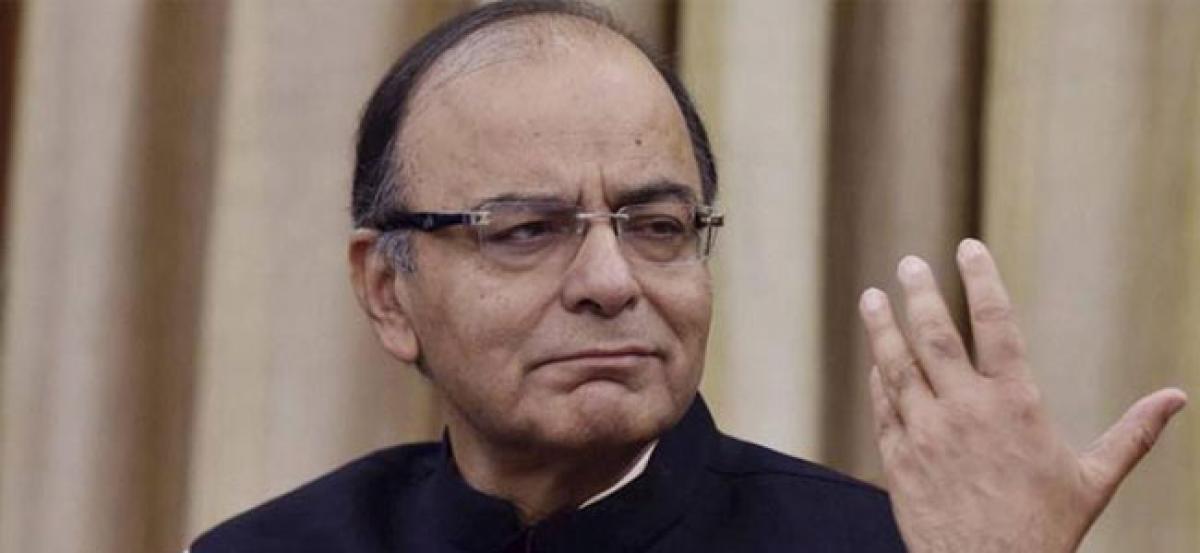Live
- Assam only state to see dip in road accidents: CM Sarma
- MP BJP to celebrate former PM Vajpayee's birth anniversary on Dec 25
- Christmas Eve 2024: Heartwarming Messages To Share With Your Loved Ones
- PM Modi holds brainstorming session with economists in run-up to Budget
- “Telangana Ready to Support AI Technologies That Drive Social Impact,” says Special Chief Secy, Jayesh Ranjan at Woxsen University’s Future Tech Summit 2024
- Hero Motosports Team Rally Announces Squad For Dakar Rally 2025
- Two Men Found Dead In Parked Caravan In Kerala
- Mandhana moves closer to top spot in ODI, T20I rankings
- IND vs AUS Boxing Day Test 2024: Sam Konstas Debuts, Travis Head’s Fitness in Question
- Congress Challenges Election Rule Amendments In Supreme Court
Just In

Union Minister Arun Jaitley on Thursday said that the Supreme Court verdict has made it clear that the Delhi government has no police powers and, hence, it cannot set up an investigating agency to probe crimes committed in the past
Jaitley said judgement elaborates at length constitutional philosophy behind Constitution and reaffirms precisely text of Constitution.
New Delhi: Union Minister Arun Jaitley on Thursday said that the Supreme Court verdict has made it clear that the Delhi government has no police powers and, hence, it cannot set up an investigating agency to probe crimes committed in the past.
He also said that the presumption that the issue concerning administration of the Union Territory cadre of services has been decided in favour of the city government would be "wholly erroneous", the minister said in a Facebook post on Supreme Court's observations in the Delhi government case.
"There are several issues which had directly not been commented upon, but by implication there is some indication of those issues. However, unless issues of importance are flagged, discussed and a specific opinion is rendered, none can assume that silence implies an opinion in favour of one or the other," Jaitley said.
As Delhi has no police powers, it cannot set up an investigative agency to probe crimes as had been done in the past, the minister said.
"Secondly, the Supreme Court has held categorically that Delhi cannot compare itself at par with other States and, therefore, any presumption that the administration of the UT cadre of services has been decided in favour of the Delhi government would be wholly erroneous," the minister added.
The 5-judge bench of Supreme Court on Wednesday unanimously held that Delhi cannot be accorded the status of a state and clipped the powers of the Lieutenant Governor (L-G), saying he has no "independent decision making power" and has to act on the aid and advice of the elected government.
The Supreme Court laid down broad parameters for the governance of the national capital, which has witnessed a bitter power tussle between the Centre and Delhi government since the Aam Aadmi Party government came to power in 2014.
Jaitley said the judgement elaborates at length the constitutional philosophy behind the Constitution and reaffirms precisely the text of what the Constitution says.
"It does not add to the powers of the state government or the central government nor does it in any way dilute the same. It emphasises at the importance of elected state government, but Delhi being a Union Territory makes its powers subservient to the central government," he said.
Jaitley said, ordinarily, in the larger interest of democracy and federal politics, the Lieutenant Governor should accept the exercise of power by the state.
"But if it has good and cogent reasons supported by material to disagree, he can record the same in writing and refer the same to the President (i.e. the central government), which will resolve the difference of opinion between the state government and the Lieutenant Governor."
"The decision of the central government will be binding both on the Lieutenant Governor and the elected state government. Thus, hereto the opinion of the centre is over-riding," Jaitley said.
He said the judgement gives due importance to the opinion of the elected state government, but maintains the primacy of the central government in the larger interest of the national capital.
"Delhi is not a state and, therefore, there could be no assumption that powers which belong to state government's also belongs to the elected government of the Union Territory.
"It has been specifically held by the Supreme Court that it is crystal clear that by no stretch of imagination, NCT of Delhi can be accorded the status of a state under the present constitutional scheme and the status of the Lieutenant Governor of Delhi is not that of a Governor of a State, rather he remains an administrator, in a limited sense, working with the designation of Lieutenant Governor," Jaitley added.

© 2024 Hyderabad Media House Limited/The Hans India. All rights reserved. Powered by hocalwire.com







